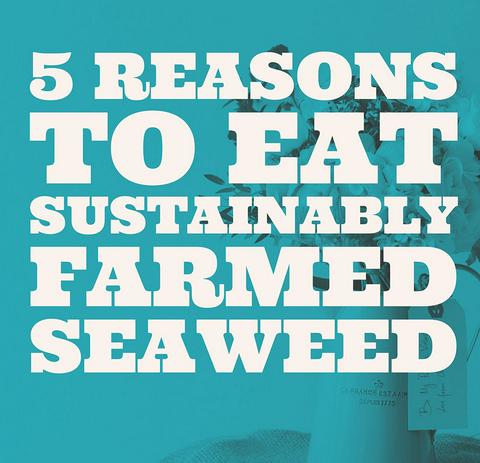5 Reasons to Eat Sustainably Farmed Seaweed
published on

I know most people make New Year’s Resolutions this time of year. I don’t, mostly because I don’t like failing at things. There was that time I promised myself I would do yoga 3 times a week - failed. Or the time I decided that once a week, I would write a hand-written letter to a friend and mail it to them - failed. So instead of New Year’s Resolutions, I participate in life betterment.
Last year, I decided to start paying more attention to my body. Sometimes that means that I take shorter, more frequent breaks at work (a minimum of hourly if possible). Sometimes it means that instead of painting my nails while I watch Jessica Jones, I stretch. And sometimes, I’ll just notice myself slouching and sit up straighter. It’s not too strict. It’s not too hard. It’s just easy enough for me to accomplish, and then I usually feel better when I do.
This year, I’ve decided to start purchasing only sustainably harvested seaweed. Why would I want to start buying and eating only sustainably harvested seaweed? Well, I did some research, and this is what I learned.
1. It’s better for the environment
Sustainable seaweed farming is similar to biodynamic farming. Instead of feeding the soil with crop rotation and composting, sustainable seaweed farmers are helping to clean the oceans. Seaweed cleans the water by removing nutrients that can lead to algae blooms.
2. It can support local seaweed farming
Sadly, much of the world’s seaweed is foraged, not farmed. The problem with foraging is that eventually, the world will run out of seaweed, just as it ran out of Quaggas and Caribbean Monk Seals (thanks asshole hunters/murderers).
If we want to keep seaweed off the extinct-plants list (that’s totally a thing riiiiight?), we should be supporting local seaweed farmers who harvest it sustainably. And buying local reduces the carbon footprint associated with shipping it from Asia.
3. It reduces the killing of fish
Seaweed farming often reduces some of the fishing in coastal regions by providing former fisherman an alternative way to earn an income.
4. It gives people (including women) jobs
In some countries, seaweed farming has given women the chance to work for a paycheck for their very first time.
5. Seaweed is super good for you
Not only is seaweed packed with nutrients that are sometimes difficult to find in other plants (B-12, iodine, iron, folate, vitamin K, and the list goes on and on), some varieties of seaweed have unique antioxidants, proteins, polyphenols, and polysaccharides. For instance, hijiki was discovered to contain a rare antioxidant called Fucoxanthin. Fucoxanthin is most widely known for its ability to burn fat in the body (without stimulating the brain), but it’s also being studied by many doctors relating to its effects against cancer.
If you live in California like I do, you can purchase Rising Tide and/or Strong Arm seaweed. However, if you live closer to another coast, I would search for a sustainable seaweed farm closer to you. Local is better. I’m also told that you can buy Moon and Tide seaweed in the northeast (based in Maine).
And once you have your seaweed, and you want to use it to make something cute, check out my spam musubi recipe.

☆☆☆☆☆☆☆☆☆☆